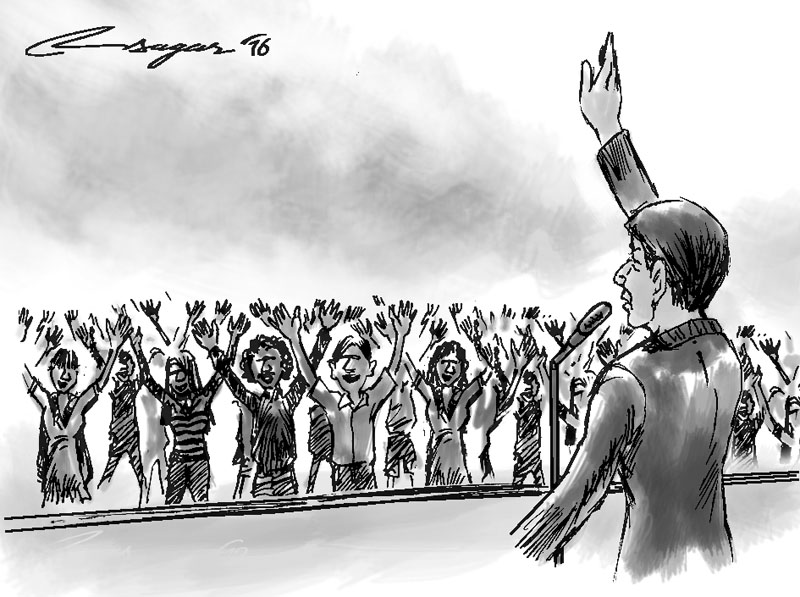Dr. King’s legacy: Power of nonviolence
Now more than ever in Nepal, all stakeholders should work together in the sincere, constructive, and non-violent spirit of Dr. Martin Luther King, Jr. to achieve mutually agreeable and lasting compromises
Today the United States celebrates the lifework and incredible legacy of one of our most influential citizens, civil rights leader Reverend Dr. Martin Luther King, Jr.
In 1994, Congress designated Martin Luther King Day as a National Day of Service, encouraging Americans to spend the day helping their communities. As a result, many see Martin Luther King Day as “a day on, not a day off,” to join together in programs to improve our communities. In schools, students study special lessons on America’s civil rights history and engage in open discussions with their teachers about human rights, racial equality, ethnic discrimination, and how to support diversity and inclusion.
The holiday presents Americans with an opportunity to acknowledge the tremendous progress our nation -- bolstered by our Constitution -- has achieved over the past 240 years to ensure citizens are guaranteed the inalienable rights of “life, liberty, and the pursuit of happiness.” We also acknowledge that mistakes were made in the past, and that we still must work hard to guarantee basic protections and equal opportunities for every American.
Public discourse over Nepal’s constitution – a document pioneering in some ways and less progressive in others -- reminds me of this history and this on-going struggle to realize full equality. Our founding fathers grappled with a number of thorny issues, such as federalism, separation of powers, and the allocation of resources. One of the most contested issues of their day – the 1790’s -- was the question of who counted as a citizen. When our constitution was passed in 1789, black slaves, Native Americans, women, and others were not given the same rights as white men.
These inequalities reflected the prevailing attitudes and practices. It took much negotiation, a terrible Civil War, legislative action, and three amendments to our Constitution to end the practice of slavery in the United States, and grant black Americans the same rights and protections as their fellow citizens. Even with these advancements, my country has often struggled to grow into the ideals laid out so eloquently in our Declaration of Independence and codified in our Constitution. Thankfully, Americans throughout my nation’s history have remained stubborn, but practical.
Civic action and the legislative process are the ways we’ve achieved progress. Between 1955 and 1968, Martin Luther King, Jr. catalyzed change in America by embracing non-violent protest methods and engaging in constructive, positive political action. With the help of millions of people who joined the civil rights movement, Dr. King’s leadership and eloquent power of speech gave people the courage to work peacefully towards these goals even when others did not. These civil rights protests created political momentum for social change, leading to new laws addressing injustice, which helped create a more equal society in America.
Dr. King’s legacy resonates today. Since he began his work over 60 years ago, people around the world seeking to create social change and to secure the rights of minorities have been drawn to his ethos, accomplishments, and above all, his tactics. With a population as diverse as Nepal’s, ensuring that all citizens -- particularly those who feel excluded -- are represented, protected, and listened to, is an enormous and necessary challenge to overcome. As I know from the American experience, ensuring genuine respect and inclusion is a task that must be pursued with seriousness, sincerity, and, ultimately, peace – as Dr. King did two generations ago. In his words: “Nonviolence is a powerful and just weapon, which cuts without wounding and ennobles the man who wields it. It is a sword that heals.”Respecting diversity is about healing, not harm.
A new Constitution is not fully implemented over night. Just as in the United States’ history, Nepal faces questions relating to democratic ideals and how they are expressed in this charter. Debates around basic legislative representation and electoral districts have fueled controversy and protests – some of them tragically violent. There is a need for patience, non-violence, and prompt compromise. Channeling the spirit of Dr. King, President Barack Obama in his State of the Union Address earlier this week, said, “Democracy grinds to a halt without a willingness to compromise; or when even basic facts are contested, and we listen only to those who agree with us.”
Now more than ever in Nepal, all stakeholders should work together in the sincere, constructive, and non-violent spirit of Dr. Martin Luther King, Jr. to achieve mutually agreeable and lasting compromises, so that the people of Nepal can move forward together as a nation. In his 1957 essay “The Power of Non-Violence,” Dr. King makes the case for why protest without force is the best way to enact social change. He said his actions were ultimately designed to find common ground between groups. He wrote:“The aftermath of nonviolence is reconciliation and the creation of a beloved community.” And that’s what the United States is working toward in Nepal, a “beloved community” that is representative of the people and delivers on the kind of social change envisioned by Dr. King.
Teplitz is US Ambassador to Nepal






